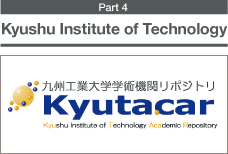
Yuki Tokuyasu
(Kyushu Institute of Technology Library)

The Kyushu Institute of Technology Academic Repository (Kyutacar) officially opened on March 3, 2008, with 709 deposited papers. Two years later, as of March 31, 2010, we provide access to 3,411 papers, or more than four times the initial number.
In deciding to operate a repository, the Kyushu Institute of Technology (Kyutech) has taken “sustainability” as its overarching goal. Day after day, the university produces an ever-increasing volume of research results. If the repository is to serve as a base station for disseminating these results, we believe that the key is to process them for public access at a steady pace, one item at a time.
Ever since Kyutacar was launched, we have proceeded step by step toward that goal. We have endeavored to increase the holdings of journal articles by personally asking faculty members to deposit their papers. To obtain doctoral theses and research reports, we have informed the campus community about the repository with the cooperation of Kyutech’s various departments. For articles in departmental bulletins, we placed the deposit process on a more systematic basis by adding electronic access to the regulations for bulletin submissions. Thus, one small step at a time, we have laid the foundations for “sustainability.”
As a result, we have published about 1,000 journal articles and retrodigitized some 280 doctoral theses and 1,600 bulletin articles. As the holdings have grown, so, gradually, has the number of downloads, convincing us that our day-to-day efforts are beginning to bear fruit.
To put the work of publishing such a large volume of papers on a more efficient basis, we have also expanded our system by, for example, linking the Publications Database to the repository system. By building a consent process for upload to the repository into the Publications Database, we save the faculty members labor and streamline the deposit work by enabling the database inputs to be used directly as inputs to the repository.
The link has been functioning since August 2008, and to date we have obtained consents for some 200 papers. Not all of these can be deposited, however; so far, we have been able to upload only about 60 of them. This disparity is explained in many cases by lack of permission from the publisher or academic society that holds the copyright, but even when this has been obtained, work may be held up because we lack the text of the article itself. These delays suggest that in addition to the rights barrier—the fact that the author’s permission alone is often not enough—there are also issues to be solved in our processing methods. Drawing on the information we have gathered about the state of copyright permissions and our growing operational know-how, we intend in future to design a smooth process from permission to publication.
I should mention that, during these two years, the library staff in charge of the repository have had a change of heart. In the early days, we felt driven to publish large numbers of papers rapidly and to expand the system as other universities have done. With time, however, as we developed routines and a solid management structure, we began to question that sense of urgency. We realized that rapidly uploading large volumes of papers and expanding the system by leaps and bounds would not necessarily lead to sustainability. Trying to do everything at once could actually destabilize the management of the repository and make it more difficult to keep it going. We felt that the way to achieve both stability of management and sustainability of the repository was to take the long view: to do all that we can now and not worry about what we cannot do at present, as we may be able to do it as time goes on.
We have yet to make our presence adequately known even on Kyutech’s own campus, where I still often hear people ask, “What’s a repository?” However, since “sustainability” means “to keep going long into the future,” we will take the time to get it right, step by step. We still face a host of challenges and tasks that we don’t even know where to begin. But, even in this trial-and-error way, I believe that it is the mission of the library and the duty of the university to achieve sustainability. |

